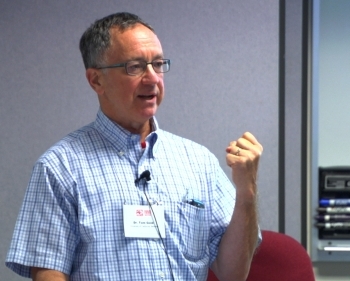
Thomas B. Gold
Thomas B. Gold is Professor of Sociology at the University of California. Since 2000 he has also served as Executive Director of the Inter-University Program for Chinese Language Studies (IUP), a consortium of 14 American universities which administers an advanced Chinese language program at Tsinghua University in Beijing. (http://ieas.berkeley.edu/iup]. At Berkeley he has also served as Associate Dean of International and Area Studies, Founding Director of the Berkeley China Initiative, and Chair of the Center for Chinese Studies.
Professor Gold got interested in China as an undergraduate at Oberlin College. After graduating he taught English at Tunghai University in Taichung, Taiwan. He then received a Masters in Regional Studies-East Asia and a PhD in Sociology, both from Harvard University. While at Harvard he was among the first group of American exchange students to study in China, spending a year at Fudan University in Shanghai, from February 1979-February 1980. He also worked part-time for many years as a Chinese language escort-interpreter for the Sate Department.
Prof Gold’s research focuses on many aspects of the societies of East Asia, primarily mainland China and Taiwan. In the largest sense, he examines the process of the emergence of the increasingly empowered and autonomous individual and a private sphere in societies which have combined traditional and modern forms of authoritarian rule. He explores this from many angles: youth and the life course; personal relations (guanxi, social capital), private business and entrepreneurship, popular culture, non-governmental organizations, and civil society.
His book, State and Society in the Taiwan Miracle (1986) was the first to apply theories of dependency, world systems and dependent development – up to that time based mainly on the experience of Latin America - to an East Asian case. He continues to write about changes in Taiwan society since the end of Martial Law in 1987.
Prof Gold regularly teaches courses on Introductory Sociology, Development and Globalization, and Contemporary Chinese Society. He recently taught seminars on “’’The Simpsons’’ Global Mirror,” North Korean Society, and non-profits in the education field. He won a Distinguished Teaching Award from the Division of Social Science in 2007. He is teaching in the UC Education Abroad Program at Fudan University, Shanghai, in the fall of 2012.
Prof Gold is a strong advocate of public sociology and has served on the boards of many civic organizations. He currently sits on the boards of The National Committee on U.S.- China Relations, the Asia Society of Northern California, and East Bay College Fund, which provides scholarships and mentors for graduates of Oakland public high schools who attend four-year colleges or universities. He is an adviser to Strait Talk and East-West Coalition, two international student groups, and is an external advisor to programs at universities in Japan and Singapore. He serves on the editorial board of many scholarly journals as well. He received the Chancellor’s Award for Civic Engagement in 2010.
Books:
(in preparation) Remaking Taiwan: Society and the State Since the End of Martial Law.
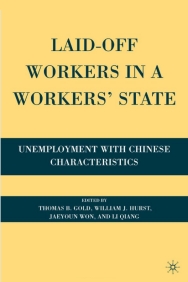 (2009) Laid-Off Workers in a Workers’ State: Unemployment With Chinese Characteristics, co-edited with William Hurst, Jaeyoun Won and Li Qiang. (Palgrave-McMillan)
(2009) Laid-Off Workers in a Workers’ State: Unemployment With Chinese Characteristics, co-edited with William Hurst, Jaeyoun Won and Li Qiang. (Palgrave-McMillan)
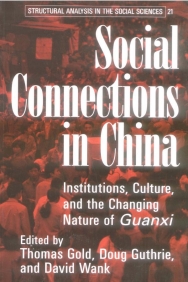 (2002) Social Connections in China: Institutions, Culture, and the Changing Nature of Guanxi, co-edited with Doug Guthrie and David Wank (Cambridge University Press).
(2002) Social Connections in China: Institutions, Culture, and the Changing Nature of Guanxi, co-edited with Doug Guthrie and David Wank (Cambridge University Press).
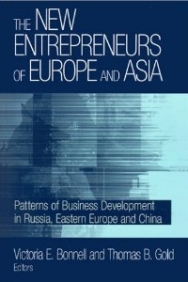 (2002) New Entrepreneurs of Europe and Asia: Patterns of Business Development In Russia, Eastern Europe and China, co-edited with Victoria Bonnell (Sharpe).
(2002) New Entrepreneurs of Europe and Asia: Patterns of Business Development In Russia, Eastern Europe and China, co-edited with Victoria Bonnell (Sharpe).
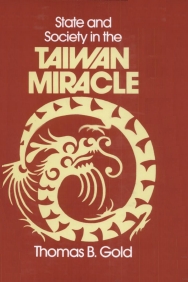 (1986) State and Society in the Taiwan Miracle. (Sharpe)
(1986) State and Society in the Taiwan Miracle. (Sharpe)
Articles and Book Chapters:
Chapped Lips, Chipped Teeth: Sino-North Korean Relations in the Post Kim Jong Il Era," New Zealand Journal of Asian Studies, 15(1), June 2013, pp. 60-76.
(2012) “Complex Characters: Relearning Taiwan,” in Mobile Horizons: Dynamics across the Taiwan Strait, edited by Wen-hsin Yeh. (Berkeley: Institute of East Asian Studies, China Research Monograph 69, 2013), pp. 235-258.
(2010) “Taiwan in 2009: Eroding Landslide,” Asian Survey, L(1), January/February, pp. 65-75.
(2009) “Taiwan in 2008: My Kingdom for a Horse,” Asian Survey XLIX(1), January/February, pp. 88-97.
(2008) “China,” in Countries at the Crossroads 2007: A Survey of Democratic Governance, ed. Sanja Kelley, Christopher Walker, and Jake Dizard (Freedom House/Rowman and Littlefield), pp. 161-195.
(2000) “The Waning of the Kuomintang State on Taiwan,” in State Capacity in East Asia: China, Taiwan, Vietnam and Japan, ed. Kjeld-Erik Brodsgaard and Susan Young. (Oxford University Press), pp. 84-113.
(1998) “Bases for Civil Society in China,” in Reconstructing Twentieth-Century China: State Control, Civil Society, and National Identity, ed. Kjeld-Erik Brodsgaard and David Strand (Clarendon Press), pp. 163-188.
(1997) “Taiwan: Still Defying the Odds,” in Consolidating Third Wave Democracies: Regional Challenges, ed. Larry Diamond, Marc F. Plattner, Yun-han Chu, and Hung-mao Tien. (Johns Hopkins University Press), pp. 162-191.
(1996) “Taiwan Society at the Fin de Siecle,” China Quarterly, 148, December, pp. 1091-1114. (reprinted in Contemporary Taiwan, ed. David Shambaugh (Clarendon Press, 1998 ), pp. 47-70).
(1996) “Civil Society in Taiwan: The Confucian Dimension,” in Confucian Traditions in East Asian Modernity: Moral Education in Japan and the Four Mini-Dragons, ed. Tu Wei-ming. (Harvard University Press), pp. 244-258.
(1994) “Civil Society and Taiwan’s Quest for Identity,” in Cultural Change in Postwar Taiwan, ed. Stevan Harrell and Huang Chun-chieh. (Westview Press), pp. 47-68.
(1993) “’Go With Your Feelings’: Hong Kong and Taiwan Popular Culture in Greater China,” China Quarterly, 136, December, pp. (reprinted in Greater China: The New Superpower? ed. David Shambaugh. (Oxford University Press, 1995, pp. 255-273).
(1991) “Youth and the State,” China Quarterly, 127, September, pp. 594-612. (revised and reprinted in The Individual and the State in China, ed. Brian Hook (Clarendon Press, 1996), pp. 175-195.)
(1990) “Urban Private Business and Social Change,” in Chinese Society on the Eve of Tiananmen, ed. Deborah Davis and Ezra F. Vogel (Harvard University Press), pp. 157-178.
(1989) “Guerilla Interviewing Among the Getihu,” in Unofficial China: Popular Culture and Thought in the People’s Republic, ed. Perry Link, Richard Madsen, and Paul Pickowicz. (Westview Press), pp. 175-192.
(1985) “After Comradeship: Personal Relations in China Since the Cultural Revolution,” China Quarterly, 104, December, pp. 657-675.